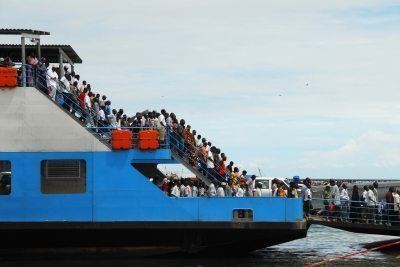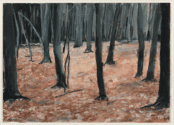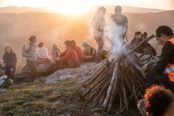[dropcap style=”font-size:100px; color:#992211;”]T[/dropcap]his is the start of an old story.
It’s one that’s lingered, like smoke from a dying cigarette, the memory smoldering down to the filter, the embers dying as time goes by.
It’s December 2009. At the time, I was a fresh-faced former Peace Corps Volunteer who’d just completed two years in rural Niger, not necessarily on my own terms, but completed nonetheless.
[quote]his block and tackle exposed
to the elements, flopping around
like a dying fish[/quote]
I was on a bus at five in the morning, headed west for Burkina Faso and what would become the next nine months of my life: an overland trip from Niamey through Mali, Côte d’Ivoire, Liberia, Sierra Leone, through the mountains, the jungle, the delta, and the plains and up the West African coast to Morocco and Europe.
We hit the border at dawn, just as it opened. It was a cold morning, promising a hot day. While I waited for my bags to be checked by immigration, then customs, I spied a large man, hair unkempt and dirty, wearing thirty-odd coats and no trousers, his block and tackle exposed to the elements, flopping around like a dying fish.
Somehow, this image represents everything I’ve done for the past four years.
Sure, he was crazy. He proved that by accosting people menacingly before staggering off laughing. In the cold morning air, while I drank my tea, he ambled over to me. Sat down on the step next to me and had a laugh imitating the white man who’d come to this remote border so far from everything, its only reason for existence being the intersection of highway and colonial partition.
Others looked on, intrigued by what I might do to what could be considered a slight. I only laughed, and continued to drink my tea. Eventually, he moved on, his dirty backside roving between buses and trucks in search of his own breakfast.
If I start to look back on my travels, I think about how crazy they were at the time. In 2009, I knew nothing about the places I would go. In some ways, I felt so prepared, so ready to face the world. I had lived two years in one of the poorest countries on Earth, certainly the poorest in West Africa. Everything from here on out would be a step up. I spoke a local language. I knew a lot about local culture. I had about thirty-seven reasons as to why I could make it, all these jackets keeping me warm and safe. Underneath, I really wasn’t wearing any pants.
I didn’t have a route planned. Initially, I thought I’d go across Mali, to Senegal, and then north. I only added the coast countries on a dare from a friend who’d traveled West Africa. Less a dare, actually, than just an admission: Côte d’Ivoire, Liberia, and Sierra Leone just proved too difficult. The visas were too expensive, the logistics were terrible. If you could make it, I’d be impressed.
That was a good enough reason for me, and so I walked out that door swaddled in coats and naked from the waist down.
[quote]how can you calculate risk when
you’re a stranger in a strange land?[/quote]
I didn’t know that Côte d’Ivoire was a year away from a renewed civil war, one that saw the government deploy artillery against its own people in Abidjan. I thought my alien status: a man with no affiliation, no skin in the game would protect me against the tension that held the country together like a taut rubber band. Maybe it did. I was nearly arrested in Bouaké for taking pictures that I shouldn’t have been taking, and rather than getting thrown in prison, I was told to get out of town.
I didn’t know that Western Côte d’Ivoire was a region in anarchy, even today only nominally under government control. Roving bands move between Liberia, Guinea, and Côte d’Ivoire looking for the next fight. Renewed conflict means loot. Violence is a paycheck. I didn’t discover how deadly that region could be until I researched my master’s thesis. Looking back, I realize now that those men all along the only road from Danané to Sanniquellie didn’t have to let us on our way. Push came to shove, quite literally, and it could have escalated further if cooler heads hadn’t prevailed.
We walked Monrovia’s streets at night; we walked the beaches in the morning. We’d been warned about both. Maybe we were just lucky. Calculated risk, but how can you calculate risk when you’re a stranger in a strange land?
In Guinea, the military junta had massacred 157 people in a stadium in the capital, Conakry, only six months prior. The security situation seemed to change daily, but why should that stop me? I was on my own mission. Besides, I had all these coats. No one can hurt me when I’m wearing all these coats. But hey, why’s my ass so cold?
In Guinea-Bissau, the army staged a coup about half an hour after we entered the country. Security checks every twenty kilometers, looking for weapons. Not that we knew any Portuguese, who knew what they were saying? The streets of the capital were deserted. We’d heard it was a sleepy town, but this is ridiculous….
Kidnappings in Mauritania. No different than the threat in Niger. I’m surely safe here, camping in the middle of the desert, a few kilometres from the nearest town. Peaceful. Moonlight turning mountains of orange sand into silent snow. Here there’s no danger, only beauty, and violence can never unseat beauty.
There’s risk in everything I guess. No matter how well prepared you are, you can’t predict all the uncertainties. No matter how many times you’ve put on a pair of trousers, every once in a while you’ll forget to zip the fly. Even now, in Zimbabwe, a country reviled for farm invasions, attacks on journalists, civil society activists, and opposition figures, I take my precautions as best I can. But surely there’s something I’m missing. I’ll only know with time. For now, I’m happy, and that’s all I can say for sure.
So to the man on the Niger/Burkina border, if you’re still there: You wore thirty-seven coats and no pants. I like your style.
Photo by Freedigitalphotos.net/Africa
Illustration by Dan Booth not to be reproduced without his express prior permission
Sterling Carter writes on the intersection of political economy, arts and culture, and human rights. He has over five years’ experience on African development, violence and conflict with organizations including Human Rights Watch, Global Witness, and Search for Common Ground. He is originally from Flora, Indiana but pulled up stakes long ago.



















